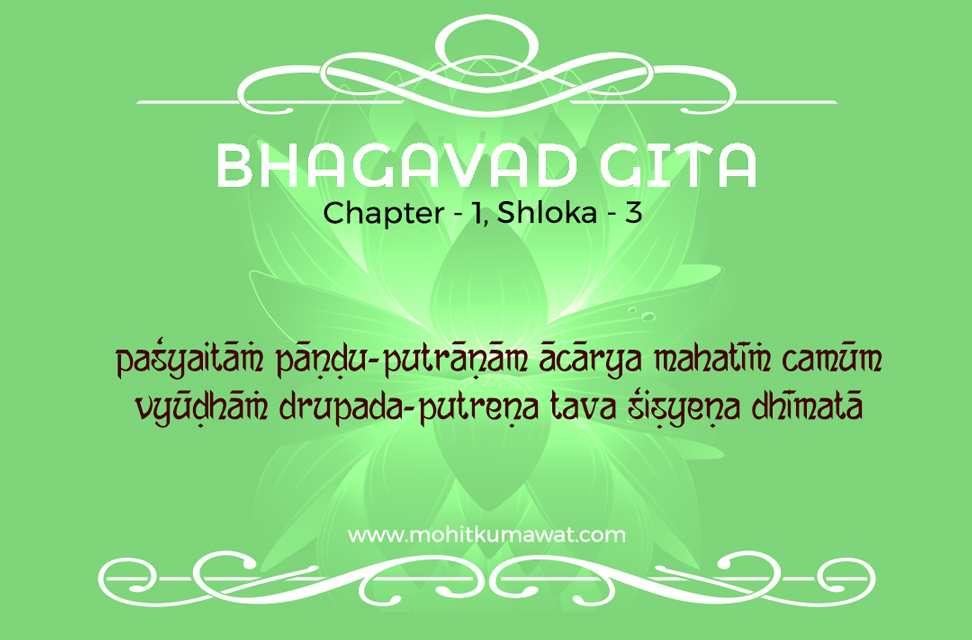
Bhagavad Gita – Chapter 1, Verse 3
Translation
TRANSLATION
Duryodhana Said:
O my teacher, behold the great army of the sons of Pandu, so expertly arranged by your intelligent disciple, the son of Drupada.
PARAPHRASE
PARAPHRASE
Duryodhan, who was a great diplomat, wanted to point out the mistakes of Dronacharya (the commander-in-chief) without being disrespectful. Through this verse, he reminds his teacher of the objective behind the birth of Dhristadhyumna (twin brother of Draupadi), that he was born out of the sacrificial fire to fulfill his father, Drupada’s desire to kill Dronacharya.
Dronacharya, a liberal brahman of excellent vows, took his old friend Drupada’s son as his disciple and did not hesitate to impart military secrets of warfare to him, knowing very well that he would one day be killed at his hands. Thus, Duryodhana wants to remind his teacher to not be lenient as far as Drupada’s son is concerned.
Duryodhan, who was a great diplomat, wanted to point out the mistakes of Dronacharya (the commander-in-chief) without being disrespectful. Through this verse, he reminds his teacher of the objective behind the birth of Dhristadhyumna (twin brother of Draupadi), that he was born out of the sacrificial fire to fulfill his father, Drupada’s desire to kill Dronacharya.
Dronacharya, a liberal brahman of excellent vows, took his old friend Drupada’s son as his disciple and did not hesitate to impart military secrets of warfare to him, knowing very well that he would one day be killed at his hands. Thus, Duryodhana wants to remind his teacher to not be lenient as far as Drupada’s son is concerned.
Story From Mahabharata – The Longest Epic
Story From Mahabharata – The Longest Epic
The Bhagavad Gita – Chapter 1 Verse 3 revisits the tale of Drupada and Dronacharya. They used to study in the same Ashrama as children. When they grew up, Drupada being Kshatriya got a kingdom of his own. At the same time, Dronacharya, a simple Brahmana, led the life of an ascetic. Driven by poverty, he went to Drupada and asked for two cows, but Drupada denied recognizing him and insulted him. Dronacharya vowed to teach his friend a lesson. With the help of Pandavas, he stripped Drupada of his Kingdom. He forced him to split it between his son Ashwatthama and Drupada.
Furthermore, driven by revenge, Drupada made a fire sacrifice for a son whose aim in life would be to kill Drona. However, years after, their rivalry ended. Drupada owned his mistake, but it was too little and too late. Ultimately, Drona had to die at the hands of Dhristadhyumna in the Kurukshetra War, whether Drupada willed it or not.
The Bhagavad Gita – Chapter 1 Verse 3 revisits the tale of Drupada and Dronacharya. They used to study in the same Ashrama as children. When they grew up, Drupada being Kshatriya got a kingdom of his own. At the same time, Dronacharya, a simple Brahmana, led the life of an ascetic. Driven by poverty, he went to Drupada and asked for two cows, but Drupada denied recognizing him and insulted him. Dronacharya vowed to teach his friend a lesson. With the help of Pandavas, he stripped Drupada of his Kingdom. He forced him to split it between his son Ashwatthama and Drupada.
Furthermore, driven by revenge, Drupada made a fire sacrifice for a son whose aim in life would be to kill Drona. However, years after, their rivalry ended. Drupada owned his mistake, but it was too little and too late. Ultimately, Drona had to die at the hands of Dhristadhyumna in the Kurukshetra War, whether Drupada willed it or not.
Ancient Vedic Wisdom to Modern Interpretation of Bhagavad Gita
Ancient Vedic Wisdom to Modern Interpretation of Bhagavad Gita
In Bhagavad Gita – Chapter 1 Verse 3, Duryodhana points out that Dhristadhyumn’s purpose in life and Dronacharya’s ultimate end are inclined. Yet Dronacharya didn’t hesitate to impart warfare techniques to him. The message from Gita is evident here, the outcome of others’ actions should not determine the course of ours. We should keep in mind to do right on our behalf irrespective of others’ intentions.
Another great message in my understanding can be, unlike other grand tales of friendship in Mahabharata, namely, Krishna & Arjuna, Krishna & Draupadi, Karna and Duryodhana, the story of Dronacharya and Drupada teaches us that not all friendships are easy. Sometimes, it is about ending up as foes to do right by your friend because when two people make the promise of friendship, not only relation blossoms but also loyalty. And at some point in life, when deceived by factors like pride, money, anger, or misunderstanding, this loyalty is tested.
Thus, through Bhagavad Gita, Mahabharata teaches us that rivalry between two friends is more adverse than the rivalry between two foes because a friend is aware of the weakest spot to hurt, only to regret it later. Therefore, as only we are responsible for our actions, thus before anything clouds our minds, sit back and think.
In Bhagavad Gita – Chapter 1 Verse 3, Duryodhana points out that Dhristadhyumn’s purpose in life and Dronacharya’s ultimate end are inclined. Yet Dronacharya didn’t hesitate to impart warfare techniques to him. The message from Gita is evident here, the outcome of others’ actions should not determine the course of ours. We should keep in mind to do right on our behalf irrespective of others’ intentions.
Another great message in my understanding can be, unlike other grand tales of friendship in Mahabharata, namely, Krishna & Arjuna, Krishna & Draupadi, Karna and Duryodhana, the story of Dronacharya and Drupada teaches us that not all friendships are easy. Sometimes, it is about ending up as foes to do right by your friend because when two people make the promise of friendship, not only relation blossoms but also loyalty. And at some point in life, when deceived by factors like pride, money, anger, or misunderstanding, this loyalty is tested.
Thus, through Bhagavad Gita, Mahabharata teaches us that rivalry between two friends is more adverse than the rivalry between two foes because a friend is aware of the weakest spot to hurt, only to regret it later. Therefore, as only we are responsible for our actions, thus before anything clouds our minds, sit back and think.

Among friends, there exists no monetary status,
For friendship itself is a pot of gold.
Among friends, there exists no societal status,
For friendship knows no skin differences.
Among friends, no one is above or below anyone,
For friendship knows no kind of supremacy.
Among friends, there exists no monetary status,
For friendship itself is a pot of gold.
Among friends, there exists no societal status,
For friendship knows no skin differences.
Among friends, no one is above or below anyone,
For friendship knows no kind of supremacy.
And for the sake of it, while the world is becoming commonplace for its betrayals and rivalry, let’s take some lessons from the ancient Wisdom of Bhagavad Gita and try to embrace the fact that this one relation which you are free to choose should not be rusted with spontaneous wrong actions. And by happenstance, if done, then let’s not hesitate to ask for forgiveness and in time, because friends are best forgivers and forgetters.
And for the sake of it, while the world is becoming commonplace for its betrayals and rivalry, let’s take some lessons from the ancient Wisdom of Bhagavad Gita and try to embrace the fact that this one relation which you are free to choose should not be rusted with spontaneous wrong actions. And by happenstance, if done, then let’s not hesitate to ask for forgiveness and in time, because friends are best forgivers and forgetters.
